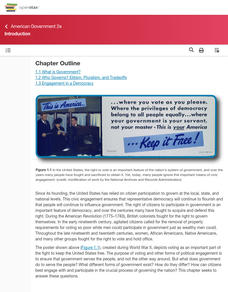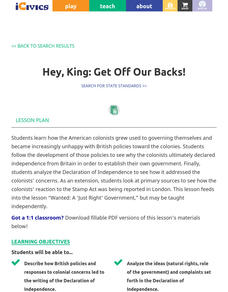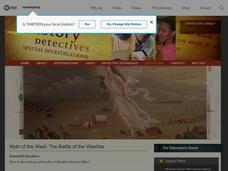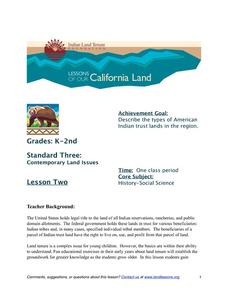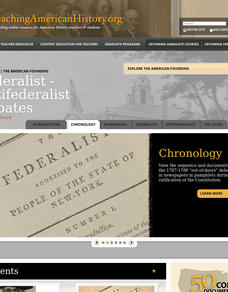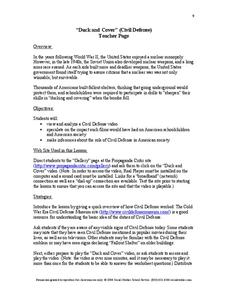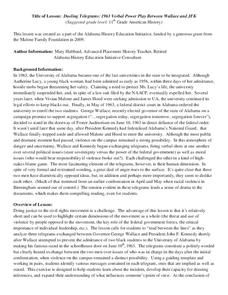Rice University
American Government 2e
An informative resource provides a textbook on American government that covers topics such as the definition of government and how democracy works. Each section provides brief questions at the end to assess scholars' understanding.
National Endowment for the Humanities
The House Un-American Activities Committee
Was the House Un-American Activities Committee justified in investigating subversive influences in the entertainment industry? Part two of the three-part series of lessons that examine the anti-communism movement after World War II,...
iCivics
Hey, King: Get Off Our Backs!
Young historians explore the reason American colonists were unhappy under British rule. Class members complete hands-on activities and participate in a group discussions to understand why colonists drafted the Declaration of Independence.
American Institute of Physics
African American Inventors in History
A two-part lesson introduces young historians to the work of famous African American inventors. Groups first research and develop a presentation of an inventor that includes biographical information and information about one of their...
National Endowment for the Humanities
Lesson 2: The United States, France, and the Problem of Neutrality, 1796–1801
While the French Revolution could be considered inspired by the American Revolution, it created thorny problems for the new United States. Should the United States get involved and be drawn into a European drama? Was the US strong...
National Endowment for the Humanities
Lesson 1: The United States Confronts Great Britain, 1793–1796
After the Revolutionary War, the success of the United States was far from guaranteed. Foreign powers coveted the new land, and Great Britain challenged American sovereignty. Learners consider the challenges facing the new nation using...
PBS
Myth of the West: The Battle of the Washita
Go West, young man! Scholars use PBS video clips, slide shows, and interactive materials to create a picture of Manifest Destiny in the American West. Using a variety of primary and secondary sources, young historians learn about the...
Indian Land Tenure Foundation
Indian Trust Lands
An important aspect of studying Native American history is understanding the nature of trust lands. Budding historians will learn that as Native Americans were removed from their home lands, trust lands were provided in the form of...
Center for Civic Education
Citizenship Schools and Civic Education During the Civil Rights Movement and in the Present
Your young historians will discover the importance that citizenship education has played in the social progress of the United States as they learn about early efforts to discourage African Americans from voting in the 1960s.
John F. Kennedy Presidential Library & Museum
Military Advisers in Vietnam: 1963
How did the beginning of the Vietnam War factor into the Cold War with the Soviet Union? As part of a study of American involvement in Vietnam, class members read a letter address to President Kennedy and his response in which he...
Annenberg Foundation
The New Nation
The conclusion of the American Revolution brought about a new conflict—choosing the stye of government for the newly formed United States. Using the views of both Federalists and Anti-Federalists, learners work in pairs and groups to...
Judicial Learning Center
Civil Rights and Equal Protection
Almost every American is familiar with the Supreme Court case of Brown vs. Board of Education. Far fewer understand the constitutional reasoning or the wide-ranging consequences of the ruling in the field of criminology. The interesting...
Ashbrook Center at Ashland University
Federalist - Antifederalist Debates
Who should have the power—individual states or the federal government? Scholars research the arguments of the Federalists and Anti-Federalists during the formation of the United States Constitution. Online resources, including a vast...
Curated OER
Unit 2: Post-Revolution: The Critical Period 1781-1878
The post-Revolutionary Period of 1781-1787, also known as the Critical Period, is the focus of a series of lessons that prompt class members to examine primary source documents that reveal the instability of the period of the Articles of...
Roy Rosenzweig Center for History and New Media
Founding Documents
Teach the class about the predecessor to Declaration of Independence—the Virginia Declaration of Rights. Using the foundational documents, scholars examine the two writings to consider how they are similar and how they are different. A...
Museum of Tolerance
The Role of Citizens in a Participatory Democracy
Groups research participatory democracies and compare the role and rights of citizens in ancient history with those in recent U.S. history. Guided by a series of questions, individuals compose a persuasive essay in which they discuss the...
K12 Reader
The Attack on Pearl Harbor
After reading a short passage about Japan's involvement in World War II and why the Japanese attacked Pearl Harbor, readers are asked to analyze how the attack effected the attitudes of Americans who previously had not wanted to go to war.
Alabama Department of Archives and History
Alabama's 1901 Constitution: What Was at Stake?
Who should be able to vote? As part of a study of the 1901 Alabama Constitution, class members examine primary source document that reveal the reasons the authors gave to support their positions on this question and their assumptions in...
Constitutional Rights Foundation
The Election of 1912
The Election of 1912: an election with four competitive opponents. Pupils get to know the candidates with informative reading passages that provide context to the election. Then, the class engages in a debate and answers questions as one...
Constitutional Rights Foundation
Women in the Military
Scholars analyze the role of women in the military in United States history. Using group research, debate, and diary entries, they explore various military activity in America. To complete the lesson, young historians write an essay...
Social Studies School Service
“Duck and Cover” (Civil Defense)
Bert the Turtle models for viewers the 1950s Civil Defense Duck and Cover strategy that was supposed to protect citizens from a nuclear blast. After viewing the video, watchers are asked to consider the motivations of the producers of...
Alabama Department of Archives and History
Dueling Telegrams: 1963 Verbal Power Play Between Wallace and JFK
Information, inferences, and innuendos. Text and subtext. Class members examine telegrams exchanged between President John F. Kennedy and Alabama Governor George Wallace, studying both what is stated and what is implied by the diction...
National Endowment for the Humanities
Soviet Espionage in America
The war against Communism and Joseph McCarthy’s place in it are the focus of a series of three lessons examining postwar America from 1945-1950. This first lesson asks groups to read an introduction that describes the Verona Project and...
Roy Rosenzweig Center for History and New Media
The Homestead Act
To understand how the Homestead Act of 1862 changed the US and the lives of the people during that time, class members examine primary source materials including letters, broadsides, and images. They then assume the voice of a...


